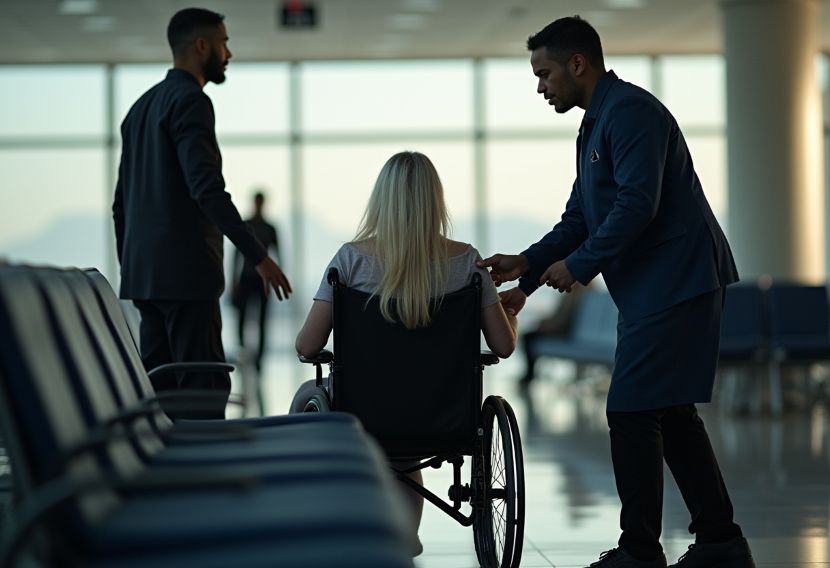Sunday, July 27, 2025

Everyone should be able to travel by airplane, but disabled passengers are rarely able to do so with ease. From not being able to get on board due to no assistance or being humiliated by their assistance with our mobility aids, disabled people are still up against it. Katie Trodler’s plane was late after staff refused to help her board There has been a spot ‘fire’ of horror stories in 2019, as the airport operator and airlines struggle to provide suitable assistance for all passengers. This is a heartbreaking situation, but not an isolated one. It raises questions about the training of airline and airport staff members, and the state of accessibility in aviation today.
Delayed Flight: A Battle for Disabled Travelers
Katie Trodler, a mother and wheelchair user, was supposed to fly out of Hamburg, Germany, when her journey began to take a darker path. Support staff did not arrive, delaying the session by over an hour. The pilot, in a last ditch effort to guarantee her trip, offered to “physically carry” her on to the flight. It was a kind gesture, but Trodler was mortified. She said as a wheelchair-user she was just trying to get around, like everyone else, without feeling like a burden.
Lack of Progress in Accessibility
The story of Katie illustrates a larger problem: Nothing has changed in the way disabled passengers are assisted on commercial flights. Welsh Paralympic gold medallist David Smith said that despite strides, attitudes towards people with disabilities have hardly changed in the last twenty years. Many workers remain untrained to help people with mobility challenges, he said.
The Civil Aviation Authority (CAA) has accepted some positive investing in the area, saying some airlines and airports had made investment. But they have acknowledged work needs to be done, particularly when it comes to staff training and co-ordination.
Feeling Like a Burden: Disabled Passengers Endure Agonizing Air Travel
The embarrassment of travel delays is familiar territory for disabled passengers. Karen Beattie, who is wheelchair-bound after a spinal injury, said she was exasperated by the lack of communication between airport staff. But then there was the time when a member of staff mishandled an aisle chair, and she almost fell out of it as she was being board. Not only do these kinds of scenarios lead to pain, but it can be quite embarrassing! Many times Karen felt that she had been the delay, yet only added to the anxiety with the travel load.
The Call for Urgent Action
Disability rights groups, including Disability Rights UK, have called for urgent changes. They say that disabled passengers are too often treated as second-rate travelers. The organization is demanding airlines, airports and regulators take uniform action to ensure dignity, autonomy and respect toward travelers with disabilities.
Responding to the mounting disquiet, the UK government commissioned a review led by Baroness Tanni Grey-Thompson, herself a former Paralympian. There were 19 critical recommendations from the review focused on improving access to air travel, including for all staff in aviation to undertake disability awareness training. That is everything from ground staff through to the crew members and hospitality staff.
Never has Air Travel been so Safe and so Dignified
The CAA has joined the calls for improved staff training, observing that access standards have improved but are still not perfect. CAA traffic and market enforcement director Michael Hoddoe mentioned that they welcome this news that at least one airline will now allow disabled and other passengers with complex needs to be accompanied by their chosen support [workers], despite the ordinary fare rules. They said that they’d been heartened by the progress but that they would press on to enforce the requirement that the airlines fulfill their obligations to disabled individuals.
Recommendations for Improvement
Consistent with the findings of Grey-Thompson’s report, the review also included a range of recommendations to enhance services for mobility impaired passengers. Among the recommendations: mandated training for airline and airport personnel to more effectively meet passengers’ needs – resulting in safer, more dignified boarding and deplaning. The report also recommends improving communication between passengers with disabilities and staff to make concerns known before and during travel.
Technological Support and Innovative Solutions
It One possible aid for disabled passengers is technology. Statements: Innovative tools, such as mobile apps and help bots, could also address the communication challenge that exists between staff and disabled passengers. A few airports are already starting to put these technologies to use, for instance letting passengers request help via their smartphone before they even get to the airport. Such networks might provide a noticeable enhancement to the quality of service, making it more efficient and individual.
What Airlines Have to Do with This
The airport team already shoulders a lot of the responsibility, but it’s just as important for the airlines to pull their own weight and make things better for disabled passengers. Airlines must be forced to cooperate closely with airports in order to make sure they have the right equipment and personnel (and then trained properly) to assist passengers with mobility problems. More importantly, airlines need to not make a fucking handicap passenger go through the humiliation of a delayed flight or unsafe boarding procedure because they didn’t do their damn job.
Future: The Reality of Air Travel Accessibility
It’s evident that, while there have been some enhancements, some baggage size, weight and shape restrictions remain major concerns for disabled passengers who want to fly. From the potential of wheelchairs getting damaged to being stranded without help, these passengers aren’t strangers to extenuating stress and discomfort. With further advocacy, education and advances in technology, the dream is that one day all air travelers will have full access, and enjoy the dignity and respect they are entitled.







